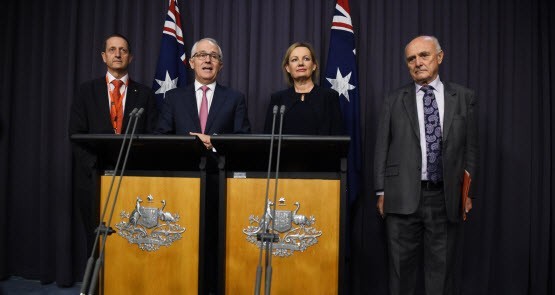
The federal government will shift the emphasis of mental health care to primary care and to a regional and local focus in an effort to address a fragmented system and treatment delivered via a one-size-fits-all approach.
The government’s long-awaited response to the National Mental Health Commission’s Review of Mental Health Programs and Services, after months of consultation with an expert reference group, was revealed this morning by the Prime Minister and Health Minister Sussan Ley.
In accordance with the brief given to the National Mental Health Commission, there are no new dollars attached to the response, but a dramatic overhaul of the way around $10 billion of Commonwealth funding is allocated in the sector.
After a three-year transition period, Primary Health Networks will both plan and commission mental health services for local areas using locally available providers and based on identification of regional needs, with redirected and more flexible funding to bolster PHN expertise and greater control by PHN of funding for all mental health programs. A stepped care model will also be embedded in this care process to recognise different mental health needs and place greater emphasis on prevention. A key finding of the NMHC’s review was that the current focus of the “mental health system”, such as it is, is at the acute end of care, rather than prevention and early intervention. Existing programs like the “Better Access” program, which funds mental health services through Medicare, will be retained but refocused to ensure they are better tailored to individual needs.
There will also be unified online and telephone gateway to mental health programs, ending the fragmentation of existing services and providers. Currently fragmented children’s mental health services will be joined up, and a single school-based mental health program established.
There will also be a trial of a program to better support young people to remain in employment or education and better target resources at early intervention for young people at risk of developing severe mental illness. Improvements will also be made to the cultural appropriateness of mental health programs for Aboriginal and Torres Strait Islander people, who generally have poorer access to mental health services. PHNs will also develop mental health plans with Aboriginal community-controlled health services. There will be a new national suicide prevention strategy, particular for indigenous communities (where suicide rates have remained static, while non-indigenous suicide rates have fallen noticeably) and an improvement in post-acute care support for people who have attempted suicide or self-harmed.
The redirection of funding to PHNs will also enable better performance information about mental health programs, following criticism that services like headspace produce little information to determine their effectiveness.
The government has also committed to ending the fragmentation of services that people with severe or complex mental illness face, with better co-ordination of care and an effective transition into the National Disability Insurance Scheme.
While the lack of additional funding will be criticised, the response has been welcomed by health groups, including sector peak body Mental Health Australia. A longer-term issue is how the states and territories will react to what is the inevitable logic of the government’s response — that funding shift from acute care (by and large funded by state governments) to primary care and allied professionals in that sector (by and large funded by the Commonwealth). Ley wouldn’t be drawn on that issue today, saying funding shifts would only occur “in agreement with the states”.
The states and mental health advocates would prefer that acute funding remain the same and primary and early intervention funding come from the budget, but the Commonwealth isn’t in a position to do that currently. Any additional funding in mental health will have to come from elsewhere in the health budget.








Bernard
It is not correct to say “states and mental health advocates would prefer that acute funding remain the same”. The states will always mount an initial argument against any reduction or perception of reductions in hospital bed funding. The fact that the NMHC proposal never moved money out of hospitals is a misunderstanding or misrepresentation of what they actually proposed.
But if you talk to state Ministers, senior clinicians and the Mental Health Commissioners in WA, NSW and Qld they all have plans to move resources to the community sector. People are dining not because we have a lack of hospital beds – they die due to a lack of capacity to prove recovery and early intervention services in the community.
Nearly half of all acute MH beds (some 6000) on any one night of the week are occupied by people who do not need acute care. They are there because there are no alternatives. That is a really dumb use of scarce resources.
What the government wants to see is much more effective, integrated primary and community care and better transitions for people into and out of those hospital beds if that is needed.
diversion
Three thimbles and an ever diminishing pea..
YayBouy – there’s a Pea?
Better, as in ‘not worse’, than I expected!
Is it so difficult to get this right?
Part of the Howard government of studied neglect, then Abbott’s – excuses needed, to raise the GST (and trust that will be the way it’s spent) – how are we going to pay for this Generous Spending Turnbull?